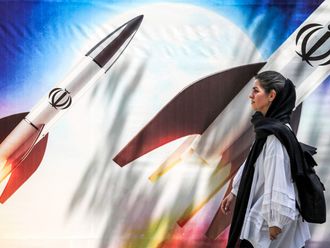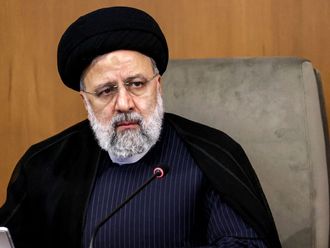Dubai: US President Donald Trump is hammering in the last nails into the coffin of the peace process, Palestinian and Arab political experts have said. After announcing last month the US recognition of occupied Jerusalem as Israel’s capital, Trump is “mutilating the body” with his threats on Tuesday to cut aid to Palestinians, the analysts said.
“The peace process, under the American definition, was shot dead by Trump’s decision to recognise [occupied] Jerusalem as Israel’s capital. Today, he is mutilating the body, not more than that,” said Hunaida Ganem, director of West Bank-based Palestinian Forum for Israeli Studies (Madar).
Last month’s announcement constituted a strategic shift in Washington’s policy and brought both the right wing in Israel and the evangelical Americans closer, Ganem told Gulf News.
US aid to the Palestinians, estimated at hundreds of millions of dollars annually, is given either directly or through the United Nations Relief and Works Agency for Palestine Refugees in the Near East (UNRWA).
Stopping the aid would negatively impact the Palestinians, in terms of some developmental projects, said analysts. However, it also carries a positive effect.
“It is about time for the Palestinians to look to other sources of financing,” said Ganem.
Palestinians also need to look at other political supporters in the international arena.
“The position of the world’s countries, especially the European Union, vis-a-vis the issue of [occupied] Jerusalem should push us to look to other dynamics, and this is not only mere talk,” commented Cairo-based Mohammad Juma’, a researcher at Al Ahram Strategic Studies Centre.
He was referring to Trump’s announcement on occupied Jerusalem as Israel’s capital. Trump also said the United States would move its embassy from Tel Aviv to occupied Jerusalem.
The move was met with world’s rejection, and Palestinian anger. At the UN Security Council, 14 countries out of 15 voted against the US move. Moreover, at the General Assembly, and despite Washington’s threats to cut aid to countries that oppose its policy, 128 countries out of 193 voted against the American decision.
International anger, including from those countries that have good relations with Washington, offers an appropriate opportunity to the Palestinians, said analysts.
“I believe the biggest concern for the Palestinians shouldn’t be looking for a substitute to the US … This is unrealistic,” said Juma’. “The central issue should be looking into other dynamics to hedge against the US decisions.”
The Palestinians should seek more internationalisation to their cause. They should move more towards the UN, and raise the cost of the occupation for the Israelis, said Juma’.
The top priority is putting the Palestinian house in order.
“The agreement to unify should be transformed to unity on the ground,” said Ganem.
Efforts to activate the Palestinians in the diaspora, particularly in Europe, can also be a strategy to follow, said Juma’.
On the other hand, Arabs need to provide a financial safety net to the Palestinian National Authority in the light of US threats, said Juma’.
“The Palestinian [National] Authority itself has to prepare the people for a peaceful struggle on the ground,” he said.
Commenting on the difficult circumstances many of Arab countries are facing, where wars have torn some countries apart, and instability is threatening some others, Juma’ said. “Despite the Arab differences, the Arab financial safety net to support the Palestinians in their struggle and show Israel’s real face [to the world] will come at a lesser cost [for the Arab world] than leaving things as they are. It is important to offer ways to help the Palestinians keep hold of their land, and provide them with the minimum means to survive.
“At the same time, support for Palestinians should be looked at as part of Arab national security and not “support of one to a brother,” he said.
Leaving the Palestinians without Arab support could open the door for other regional powers and political Islamist forces in the region to step in and expand their influence, political analysts said.
The Palestinians should expose the Israeli measures against them to the world.
Juma’ said Israel should be held responsible for its “apartheid” policy, which, usually in politics, “doesn’t last for too long”.










